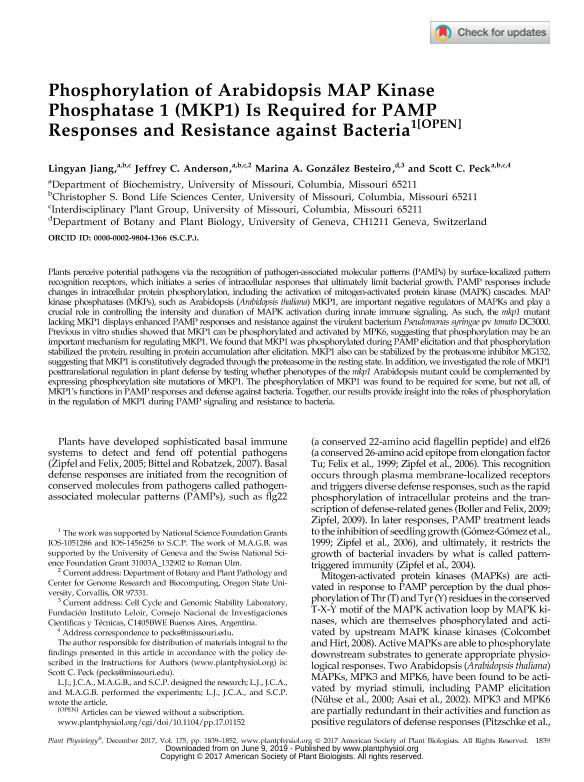Artículo
Phosphorylation of arabidopsis MAP kinase phosphatase 1 (MKP1) is required for PAMP responses and resistance against bacteria
Fecha de publicación:
12/2017
Editorial:
American Society of Plant Biologist
Revista:
Plant Physiology
ISSN:
0032-0889
Idioma:
Inglés
Tipo de recurso:
Artículo publicado
Clasificación temática:
Resumen
Plants perceive potential pathogens via the recognition of pathogen-associated molecular patterns (PAMPs) by surface-localized pattern recognition receptors, which initiates a series of intracellular responses that ultimately limit bacterial growth. PAMP responses include changes in intracellular protein phosphorylation, including the activation of mitogen-activated protein kinase (MAPK) cascades. MAP kinase phosphatases (MKPs), such as Arabidopsis (Arabidopsis thaliana) MKP1, are important negative regulators of MAPKs and play a crucial role in controlling the intensity and duration of MAPK activation during innate immune signaling. As such, the mkp1 mutant lacking MKP1 displays enhanced PAMP responses and resistance against the virulent bacterium Pseudomonas syringae pv tomato DC3000. Previous in vitro studies showed that MKP1 can be phosphorylated and activated by MPK6, suggesting that phosphorylation may be an importantmechanism for regulatingMKP1. We found that MKP1 was phosphorylated during PAMP elicitation and that phosphorylation stabilized the protein, resulting in protein accumulation after elicitation. MKP1 also can be stabilized by the proteasome inhibitor MG132, suggesting thatMKP1 is constitutively degraded through the proteasome in the resting state. In addition,we investigated the role of MKP1 posttranslational regulation in plant defense by testing whether phenotypes of the mkp1 Arabidopsis mutant could be complemented by expressing phosphorylation site mutations of MKP1. The phosphorylation of MKP1 was found to be required for some, but not all, of MKP1’s functions in PAMP responses and defense against bacteria. Together, our results provide insight into the roles of phosphorylation in the regulation of MKP1 during PAMP signaling and resistance to bacteria.
Palabras clave:
MAP KINASE PHOSPHATASE
,
PAMP RESPONSES
,
PHOSPHORYLATION
,
ARABIDOPSIS
Archivos asociados
Licencia
Identificadores
Colecciones
Articulos(IIBBA)
Articulos de INST.DE INVEST.BIOQUIMICAS DE BS.AS(I)
Articulos de INST.DE INVEST.BIOQUIMICAS DE BS.AS(I)
Citación
Jiang, Lingyan; Anderson, Jeffrey C.; González, Marina Alejandra; Peck, Scott C.; Phosphorylation of arabidopsis MAP kinase phosphatase 1 (MKP1) is required for PAMP responses and resistance against bacteria; American Society of Plant Biologist; Plant Physiology; 175; 4; 12-2017; 1839-1852
Compartir
Altmétricas




